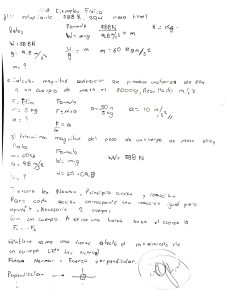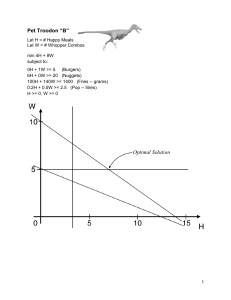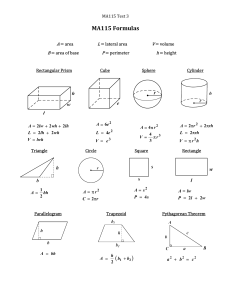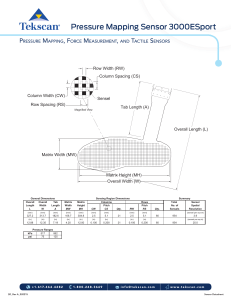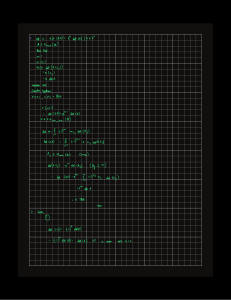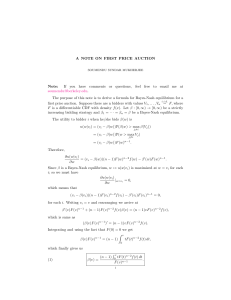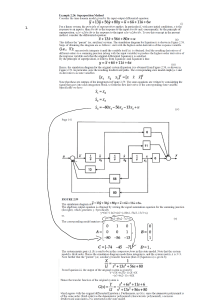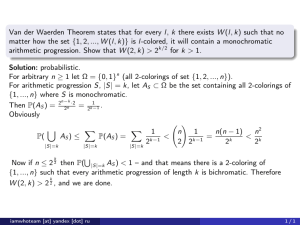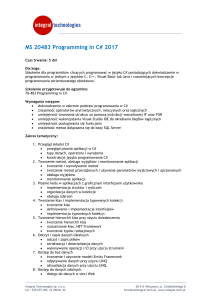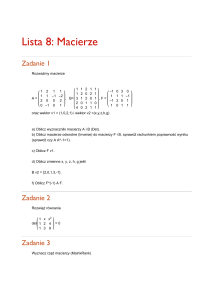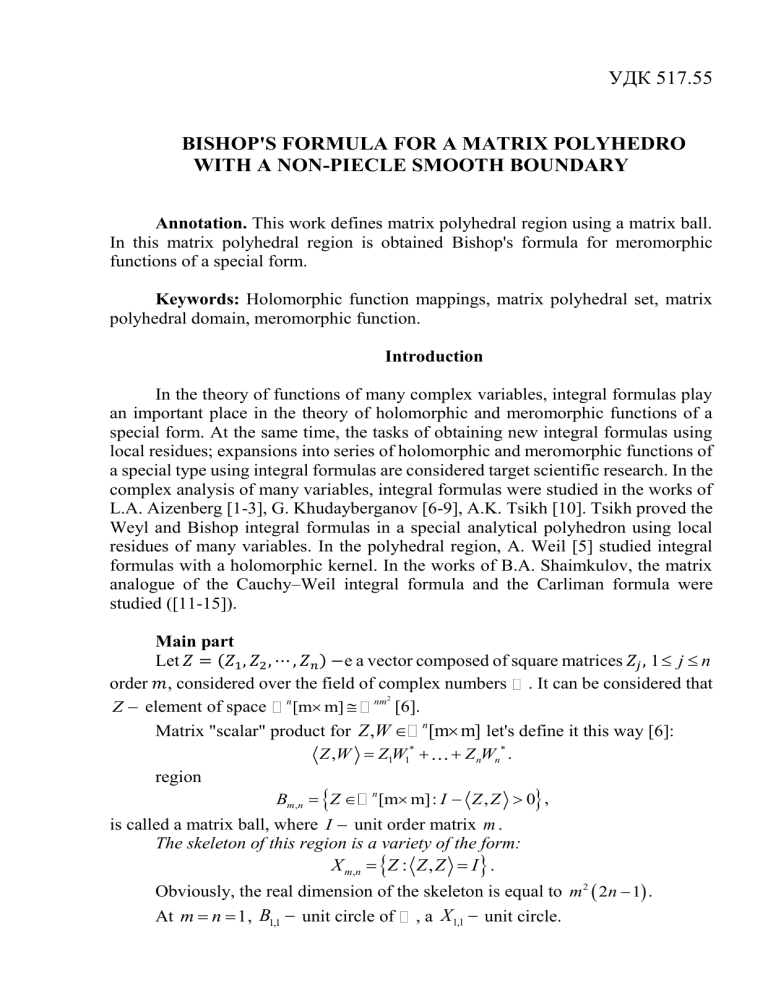
УДК 517.55 BISHOP'S FORMULA FOR A MATRIX POLYHEDRO WITH A NON-PIECLE SMOOTH BOUNDARY Annotation. This work defines matrix polyhedral region using a matrix ball. In this matrix polyhedral region is obtained Bishop's formula for meromorphic functions of a special form. Keywords: Holomorphic function mappings, matrix polyhedral set, matrix polyhedral domain, meromorphic function. Introduction In the theory of functions of many complex variables, integral formulas play an important place in the theory of holomorphic and meromorphic functions of a special form. At the same time, the tasks of obtaining new integral formulas using local residues; expansions into series of holomorphic and meromorphic functions of a special type using integral formulas are considered target scientific research. In the complex analysis of many variables, integral formulas were studied in the works of L.A. Aizenberg [1-3], G. Khudayberganov [6-9], A.K. Tsikh [10]. Tsikh proved the Weyl and Bishop integral formulas in a special analytical polyhedron using local residues of many variables. In the polyhedral region, A. Weil [5] studied integral formulas with a holomorphic kernel. In the works of B.A. Shaimkulov, the matrix analogue of the Cauchy–Weil integral formula and the Carliman formula were studied ([11-15]). Main part Let 𝑍 = (𝑍1 , 𝑍2 , ⋯ , 𝑍𝑛 ) −e a vector composed of square matrices 𝑍𝑗 , 1 j n order 𝑚, considered over the field of complex numbers . It can be considered that Z element of space n [m m] nm [6]. Matrix "scalar" product for Z ,W n[m m] let's define it this way [6]: Z ,W Z1W1* Z nWn* . region Bm,n Z n [m m]: I Z , Z 0 , 2 is called a matrix ball, where I unit order matrix m . The skeleton of this region is a variety of the form: X m,n Z : Z , Z I . Obviously, the real dimension of the skeleton is equal to m 2 2n 1 . At m n 1 , B1,1 unit circle of , а X1,1 unit circle. Let D bounded convex complete circular domain with Shilov boundary S, which is smooth (class С1) diversity. Let's define a class H 2 D as a class of all functions f , holomorphic in D, for which sup f r d , 2 0 r 1 S here r r 1, , r n а d normed Lebesgue measure on a manifold S, invariant under rotations. Theorem 1[6]. For every function f H 1 Bm,n the formula is valid f Z f (W )d (W ) mn I Z ,W X m , n det m Z Bm,n , (1) where d W normalized Lebesgue measure on the skeleton X m,n . Let the mapping be given f f1, domain G nm . In the future, display f f1, , f nm2 : G nm2 , holomorphic in some 2 f111 Z f Z f 1 Z m1 f11m Z , 1 f mm Z , f nm2 : G f11n Z , f mn1 Z nm2 let's present it in the form: f1nm Z :G n f mm Z n m m . Definition 1. A matrix polyhedral set defined by a holomorphic mapping f :G n m m , called a set f 1 Bm,n Z G r 2 I f Z , f Z 0, r 0 , if it is relatively compact i.e. G f 1 Bm,n Р G . Definition 2. Connected component of a matrix polyhedral set f 1 Bm,n called a matrix polyhedron (generalized matrix ball), let's denote it by f , r . Skeleton region f , r is defined as follows: f ,r Z G f Z , f Z r 2I , r 0 . Let f (Z ) D G — holomorphic domain mapping D CnZ m m G CWn m m и H Z Z meromorphic to a function. Z Definition 3 [10]. Display f Z has a finite type if for each W G the equation f Z W has in the area D the same finite number of roots, taking into account their multiplicities ([8, p.38]). Definition 4 [10]. Following the functions H (Z) regarding display f Z called function [Tr H ](W) H (Z( ) (W)) W G \ f ( 0) where the summation is carried out over all roots (taking into account multiplicities) of the equation f (Z) W . In this work, using formula (1), we obtain Bishop’s integral formula in the region f , r for a special type of function hZ , where h Z H 1 f , r , J f Z J f Z Jacobian mapping f Z , having a finite type. Let f D G — holomorphic mapping of a finite type of domain D n Z m m в G n W m m и W 0 G — arbitrary point. Consider the area Bm ,n ,r W 0 в G с центром в точке W 0 Bm,n,r W 0 W : r 2 I W W 0 ,W W 0 0 Р G . Theorem 2. Let H Z H1 D . Then for the trail [Tr H ](W ) in field Bm ,n ,r W 0 the integral formula is correct Tr H W Hd f Z mn I f Z ,W Г f , r det m where Г f , r Z D : f Z , f Z r 2 I m . , (2) Proof. For simplicity, we prove the theorem for the case W 0 0 . In view of the proposal [10, p. 33] for almost everyone W B m ,n ,r W 0 roots of a system of equations f Z W 0 simple; let's designate them Z (1) (W ), , Z( ) (W ) . Let be, U D family of disjoint neighborhoods of points Z ( ) (W ) and Г Г f Z W , Z D : f Z W , f Z W 2 I m cycle in U . Then, by the definition of a trace and the Cauchy-Szeguy formula (1), we have H d f Z Tr H W 1 Г Z W , det mn I f Z ,W m . Кроме того, в области регулярности подынтегральной формы (2) сумма Г 1 homologous to the cycle Г f ,r . Therefore, applying the Stokes formula, we obtain H d f Z 1 Г Z W , det mn I m f Z ,W Г f ,r H d f Z det mn I m f Z ,W . The theorem has been proven. Now, as a consequence of the proven theorem, we present an integral representation for the trace of a meromorphic function of a special form. Corollary 1. Let h( Z ) H1 D , J f — Jacobian mapping f D G , finite type. Then for the trace of a meromorphic function H h / J f в B n,m,r W 0 the integral formula is correct [Tr h / J f ]W f ,r hZ d Z det mn I m f Z ,W . (3) Proof. d normalized Lebesgue measure on f , r , that's why [4, p. 153] d f Z J f d Z . From the formula (2) for W Bm,n,r W 0 we get Tr h / J f W h / J f Z W Г Z W , h / J f d f Z det mn I m f Z ,W Г f ,r det mn I h d Z m f Z ,W . The investigation has been proven. The last corollary allows us to obtain an analogue of Bishop’s formula in the matrix polyhedron f , r Z D r 2 I f Z , f Z 0, r 0 m for a meromorphic function h J f . Theorem 3. If the function h Z H 1 f ,r , Z f r and at this point the h Jf Jacobian J f Z 0 , then for a meromorphic function the integral representation is valid hZ h X Z , X d X . J f Z Г f ,r Z , Z det mn I f Z , f X Proof. From the definition of trace it follows that the integral in the formula (3) at W f X equal to the sum of the function values h at points Z X and Jf the meaning of this function in the prototypes X f X 2 points W f X . Let us introduce the weight function Z , X 0 , having the following properties: for any fixed Z from f ,r Z D r 2 I f Z , f Z 0, r 0 Р D , m function (Z X ) equal to zero at all points Z X , except Z X . Such a function exists. Indeed, suppose W 0 non-critical display value f , и g Z — linear function i.e. g X W 0 various. Then we can define the function Z , X g Z g X 2 g Z g X 2 g Z g X (4) where we assume the numbering of preimages X ( ) X ( ) Z such that X (1) Z Z . Thus, the product in (4) is a polynomial in g Z , with coefficients holomorphically dependent on X . So, we have 1 Z , X ck X g k Z k 1 where ck X holomorphic functions in f r . By construction Z , X Z 0 , for points X ( ) Z Z . Using the corollary and the constructed weight function Z , X , we get Bishop's formulas in f r . Really, h Z X Z , Z X J f Z X h Z Z , Z h Z X Z , Z 2 J f Z J f Z X 2 2 X h Z Z , Z h X Z , X d X . m mn J f Z I f Z , f X Г f ,r det The theorem has been proven. Bibliography 1. Айзенберг Л.А. Многомерный аналог формулы Карлемана. Докл. АН СССР.–1984. Т. 277, № 6, 1289–1291. 2. Айзенберг Л.А.Формула Карлемана в комплексном анализе. Первые приложения.– Наука, Новосибирск, 1990, 248 c. 3. Айзенберг Л.А., Южаков А.П. Интегральные представления и вычеты в многомерном комплексном анализе – Наука, Новосибирск, 1979, 366с. 4. Арнольд В.И., Варченко А.П., Гусайин-Заде С.М. Особенности дифференцируемых отображений. М., Наука. 1982. т.1. 302 с. 5. Wеil A. L’integrale Cauchy et les fonctions de plusieurs variables.- «Math. Ann. », 1935, Bd 111, S. 178-282. 6. Худайберганов Г., Кытманов А.М., Шаимкулов Б.А. Анализ в матричных областях. Монография. Красноярск, Ташкент. 2017. С.293. 7. Худайберганов Г.Формула Карлемана для функций от матриц//Сиб. матем. журн.–1988. Т. 29, № 1. –С. 207–208. 8. G. Khudayberganov, J. Sh. Abdullayev, “Holomorphic continuation into a matrix ball of functions defined on a piece of its skeleton”, Вестн. Удмуртск. ун-та. Матем. Мех. Компьют. науки, 31:2 (2021), 296–310. 9. Gulmirza Kh. Khudayberganov, Jonibek Sh. Abdullayev, “Relationship between the Bergman and Cauchy-Szegö in the domains τ+(n−1) и RnIV”, Журн. СФУ. Сер. Матем. и физ., 13:5 (2020), 559–567 10. Цих А.К.Многомерные вычеты и их применения. –Новосибирск: Наука, 1988. –240 с. 11. Б. А. Шаимкулов. Об одном интегральном представлении для следа мероморфной функции //Узб. матем. журнал. 2002. № 1. С. 84–86. 12. Б. А. Шаимкулов. Специальное интегральное представление для локального вычета //Сиб. матем. журн. 2002. Т. 43, № 5. С. 1192–1196. 13. Б. А. Шаимкулов. “Интегральное представление Коши–Вейля для матричных функций”, Изв. вузов. Матем., 2003, 2, 68–71. 14. Б. А. Шаимкулов, Э. М. Махкамов. “Об одном аналоге интегральной формулы Вейля для полиэдров с не кусочно гладкой границей”, Сиб. матем. журн., 52:2 (2011), 476–479. 15. B.A. Shoimkhulov, J.T. Bozorov. Carleman’s formula for a matrix polydisk. Journal of Siberian Federal University. Mathematics & Physics 2015, 8(2), 371–374.
